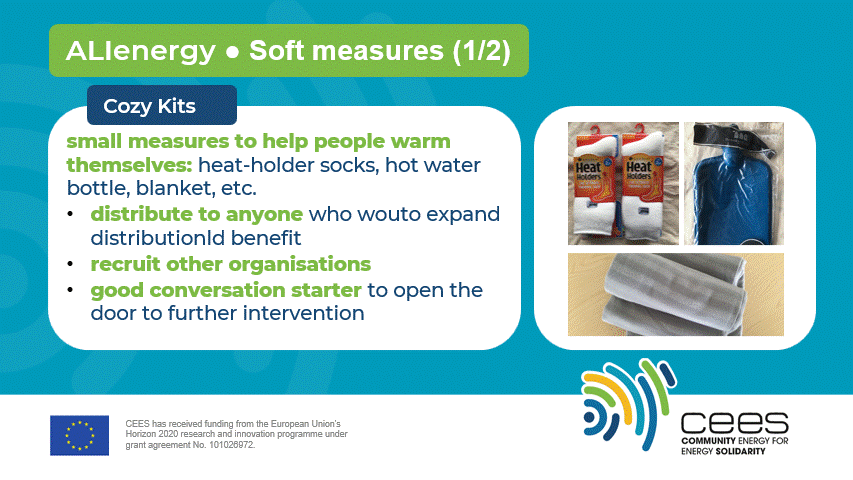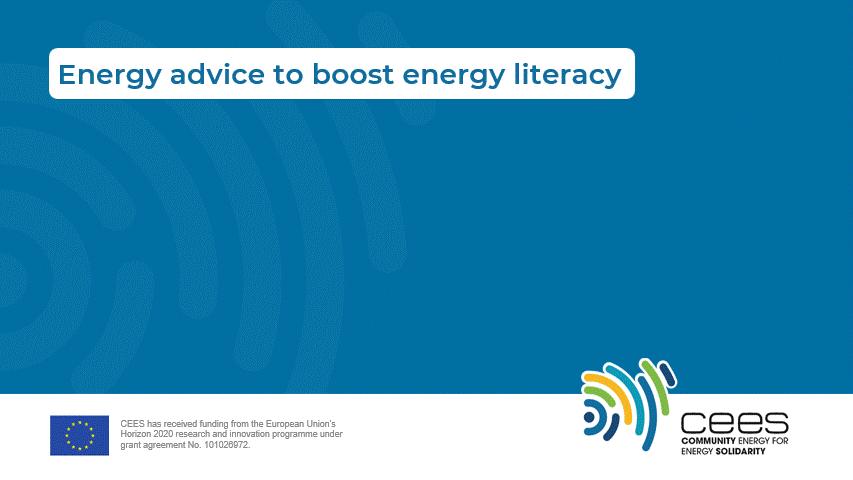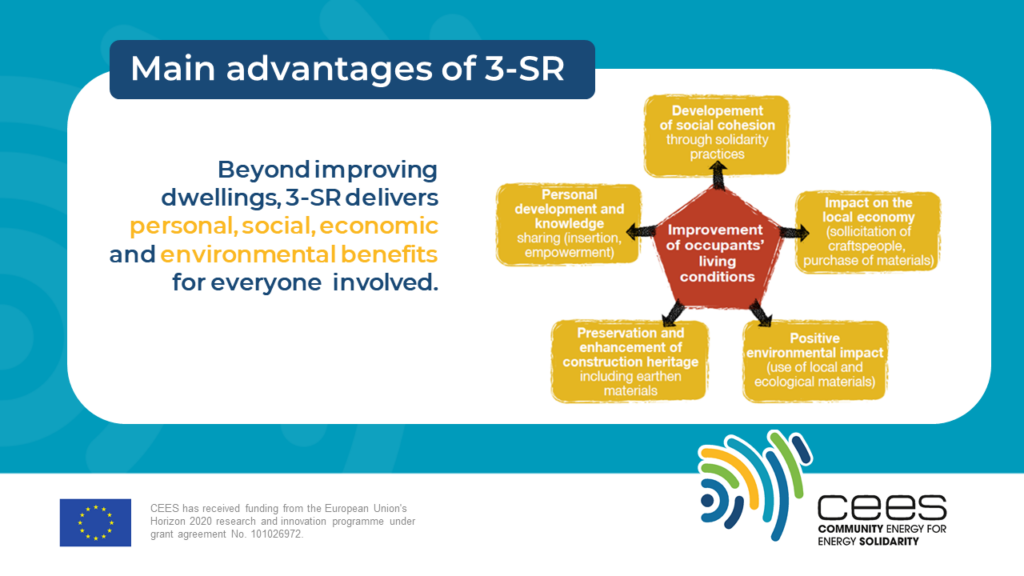With greater awareness that both the causes and impacts of energy poverty are complex, diverse actors now recognise that there are many different ways to practice ‘energy solidarity’.
In Session 3 (of 5) of the Community Energy for Energy Solidarity (CEES) webinar day, partners presented on how they ‘act’ — i.e. the practical things they do to lift people out of energy poverty or at least reduce their burden to some degree.
Soft measures refers to actions that relatively easy to organise and have low or no cost for vulnerable households. It may be providing warm clothes, blocking chimneys that cause cold draughts or sharing tips on how to optimise energy use. Or, learning how to find a supplier with lower tariffs or negotiate a re-payment plan for bills in arrears.
Hard measures are more specific to works to physically improve the dwelling, often to make it more energy efficient. Involving actions such as insulating roofs and walls, changing windows, or insulating pipes, much of this work requires some level of skill and/or assistance. Often, it carries a substantial up-front cost while delivering savings over the long term.
Different CEES partners have expertise in each area – and are sharing their knowledge and experience.
Distributing ‘Cozy Kits’, training energy advisors, ● ALIenergy
Western Scotland and the Islands can be bitterly cold and extremely windy, with high humidity in winter. Many remote houses are old, poorly built and not connected to gas mains. As such, doing deep energy renovations is complicated and costly.
In the short term, ALIenergy focuses on two primary types of soft measures: distributing helpful goods and providing customised advice. ‘Cozy Kits’ contain items that help people conserve body heat to feel warmer and stay healthier. ‘Energy Kits’ include devices to help reduce energy consumption and costs. While the kits do not directly tackle the root cause of cold homes, Rachel McNicol says they alleviate impacts. Importantly, they can pave the way for additional interventions.

Because the kits serve different purposes, ALIenergy relies on two types of distributors. Cozy Kits can easily be handed out by volunteers or by other organisations, either directly to households or through kiosks in public places. This helps build a broader network of local actors. As devices in the Energy Kits are somewhat more costly and need to be used correctly, they are usually distributed by an Energy Advisor, who has been certified through ALIenergy’s training programme.
Energy advice through energy cafés and home visits ● Coopérnico
Until recently, Coopérnico (Portugal) focused primarily on attracting investors, installing solar systems and delivering clean, low-cost energy to charitable organisations. Having adopted a mission to tackle energy poverty more directly, João Lopes described how the cooperative will pilot ways to engage with different people – in different ways, for different purposes.
In line with the research of Dr. Kevin Burchell, a member of the University of Birmingham research team supporting CEES, Coopérnico is keen to enhance energy literacy. A two-pronged strategy aims to boost energy knowledge and strengthen energy know-how among vulnerable households.

To offer people-centred energy advice in both energy cafés and home visits, Coopérnico will focus on helping people learn to ‘spend wisely’, rather than emphasising ways to ‘save energy’. This reflects findings that many households already under-consume and a general acceptance among the Portuguese that being ‘cold at home’ is normal. In turn, Coopérnico will work with local partners that can answer specific questions or provide necessary aide.
Shared, supported self-renovation ● Les 7 vents
Shifting to discussion of hard measures, Sabine Boudjemline of Les 7 vents described key principles of an approach that ensures quality work while helping keep costs low and building a sense of community. ‘3-SR’ refers to actions to improve housing conditions that involve ‘self-renovation’ (whether the occupant rents or owns the dwelling), ‘supported’ by a building professional who oversees a team of volunteers willing to ‘share’ the workload.

In contrast to the soft measures described above, 3-SR focuses on works to make the dwelling comfortable and/or more energy efficient. The measures may be quite simple – e.g. blocking draughts from chimneys, windows and doors – or could include major works such as replacing windows, installing insulation or upgrading the heating system. The range of works depends on the quality of the dwelling and the budget available. 3‑SR also promotes local sourcing and circular economy principles.
The concept of a collective ‘time bank’ may be used by some 3SR actors. Enerterre (France), for example uses a système d’échange local (local exchange system) by which individuals who volunteer for one project start ‘depositing’ credits they can draw on later to have help on their own dwelling. The household having work done initially runs a deficit that they later ‘repay’ by volunteering on other projects.
3‑SR as an approach is now recognised internationally, with a growing number of entities collaborating to refine best practices, as outlined in a guideline brochure recently published by a consortium of practitioners.
Small gestures can establish a vital foundation
An important consideration for taking action to tackle energy poverty is that ‘every little bit helps.’ Better socks or a hot water bottle can reduce the risk of health problems from being chronically cold. Devices to manage energy consumption can relieve financial pressure, freeing up resources other necessities. As it often takes several months (even or years) to plan and execute deep-level hard measures, these simple actions can be valuable in the meantime. Early engagement is a vital part of the process of understanding needs and building up the trust for people to agree to more disruptive interventions.
Watch the full webinar on youtube.
Or check out blogs and links to the other sessions:
- Community energy for energy solidarity: A timely approach for a more just future (Session 1)
- Identifying and engaging with people in energy poverty and other stakeholders (Session 2)
- Building support for ECs to tackle energy poverty: legal, regulatory and financing aspects (Session 4)
- Evaluating energy poverty projects: key principles and themes (Session 5)